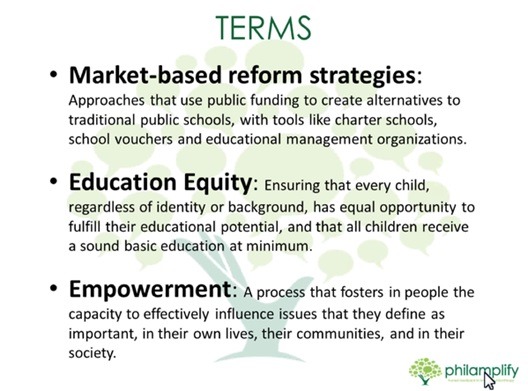
At first glance, it would have been reasonable to ask why the National Committee for Responsive Philanthropy would want to host a debate between advocates and opponents of market-based approaches in education reform. What was the upside of picking that issue for a debate above any of a number of other issues in which the efficacy of market-based strategies in significant societal issues is, so to speak, “debatable?”
The “privatization” question in public policy, in which public programs are more or less ceded to the private sector (particularly the market-driven for-profit sector) to structure and implement, is at the heart of many initiatives. Examples include the proliferation of private sector builders and operators of prisons, proposals to turn over municipal water systems to private corporations, and even the turning over of child welfare services to for-profit companies.
In this instance, the roots of the debate were in an NCRP report published in May 2015, part of NCRP’s “Philamplify” series, on the Walton Family Foundation, subtitled, “How Can This Market-Oriented Grantmaker Advance Community-Led Solutions for Greater Equity?” Compared to earlier NCRP reports on the Walton Family Foundation, notably NCRP’s 2005 report, “The Waltons and Wal-Mart: Self-Interested Philanthropy,” and its 2007 follow-up, “Strategic Grantmaking: Foundations and the School Privatization Movement, it was distinctly less critical of the ideology and agenda of the Arkansas philanthropic behemoth. Both earlier reports indicated that the foundation’s promotion of school choice, charter schools, and school vouchers in education reform had led to a pernicious undermining of public school systems.
When it comes to market approaches, however, as Sherece West-Scantlebury, the president and CEO of the Winthrop Rockefeller Foundation and chair of the NCRP board, noted at the beginning of the debate, NCRP is “agnostic.” In fact, for the Winthrop Rockefeller Foundation itself, headquartered in Little Rock, Arkansas, West-Scantlebury described the Walton Family Foundation, headquartered in Bentonville 200 miles away, as a “great partner” for her foundation’s programs. Walton has a major programmatic emphasis in its “home region,” with grantmaking focused on Northwest Arkansas and Delta region of Arkansas and Mississippi totaling more than $40 million in 2014, while Winthrop Rockefeller is totally dedicated to Arkansas’s advancement, both with overlapping commitments to education programs in Arkansas, including the two foundations’ joint sponsorship in 2014 of the “ForwARd Partnership for Arkansas Education” initiative.
The Philamplify report on the Waltons was actually complimentary of the Walton Foundation’s market-based approaches in its environmental programming, lauding the “powerful and lasting results” it has achieved in its environmental portfolio through “leveraging the power of markets as a key strategic element” (p. 13). Although the report noted the criticism of Naomi Klein that the Walton Family Foundation has been strongly connected to the “big greens” such as the Nature Conservancy and the Environmental Defense Fund (p. 29), that it has thus far sidestepped engagement in the core environmental issue of man-made climate change (p. 28), and that “the foundation’s environmental grantmaking cannot be viewed as discrete from Walmart’s corporate interests” (p. 8), the overall impression was one of the Walton Family Foundation as an effective “triple bottom line” philanthropy in environmental issues.
Public education tends to be more contentious in current politics, particularly as education reformers promote “school choice” and rigorous testing of students and teachers as a public policy agenda while teachers unions and others question the efficacy of education reform and the motivations of the reformers. While liberals tend to be more favorably disposed than conservatives to unions and more suspicious of using tax revenues for private school vouchers, they have been mixed on charter schools, which are chartered within public school systems and often established and defended by liberal groups. (Witness the pro-charter reports from the National Council of La Raza and the Center for American Progress here and here as two examples.)
On education, the NCRP’s latest Walton Philamplify report contained criticisms of the foundation’s approach, but was not as eviscerating as the 2005 and 2007 reports. The Philamplify report noted (but didn’t challenge) the Walton Family Foundation’s belief that school choice or public education in general is “the best lever to break the cycle of poverty”—that is, “improved academic outcomes are the key to better life outcomes” (p. 16). It summarized the foundation’s strategy as “rel(ying) on the core value of empowering parents to choose where their kids go to school.”
Interviewees both inside and outside the foundation acknowledged that school choice wasn’t a “silver bullet,” but the report did not question whether other motivations might be behind the foundation’s education strategies, such as reducing the size of government, breaking the teachers unions, creating opportunities for schools that allow for less-than-traditional public curricula (e.g., religious schools or those that teach dubious theories such as “intelligent design”), or using charter schools as vanguards within public systems to ultimately weaken them and replace them with private school alternatives. In fact, the NCRP report credited the Walton Family Foundation with “a genuine concern for and commitment to increasing opportunity for people living in poverty” (p. 4) and offered recommendations to “amplify [its] social justice impact.” Taking Walton’s authenticity on educational empowerment as a given, the report called for the foundation to “embody the foundation’s commitment to ‘empowerment’ by authentically engaging members of communities most affected by issues it funds so that stakeholders can help determine the most effective strategies and solutions” (p. 5).
That kind of analysis of a foundation whose donors—the members of the ultra-right-wing Walton family—are major contributors to Republican political candidates (detailed in reports, such as here, and this article from Bloomberg, though the Waltons have curried support from politicians of both parties to improve its public image and gain broader acceptance for its environmental and education strategies) was bound to raise questions of where NCRP stood on the efficacy of market approaches to education reform, as opposed to the recommendations in the report to make the Walton Family Foundation more effective by maintaining its high payout rates, continuing its focus on general operating funds, continuing its engagement of “stakeholders” in its market-oriented environmental program, prioritizing “equity” in the foundation’s educational programming, increasing its engagement of stakeholders in its education programs, diversifying its board and staff composition, and “conven(ing) grantees to foster shared learning and networking” (pp. 4-5).
The NCRP “debate,” moderated by West-Scantlebury, pitted Robert Pondiscio, a senior fellow and vice president at the Thomas B. Fordham Institute, taking the largely pro-market position, against Brandon Johnson, the deputy policy director of the Chicago Teachers Union, on the anti side, with a panel of commentators—Lori Bezahler, president of the Edward W. Hazen Foundation; Deborah McGriff, managing director of the New Schools Venture Fund; and Jennifer Esterline, project consultant for Texas Education Grantmakers Advocacy Consortium.
Pondiscio made it clear from the outset that he was “not entirely sold” on market-based approaches, finding them limited, and that he thinks “instructional reform” is as necessary as “structural reform.” He said that without instructional reform—and without the “sunshine” effects of testing—“schools of choice can and do become a second flavor of bad.” Advancing equality, he suggested, requires more than charters and choice, even though he himself is a teacher at a charter school in Harlem, because the well-to-do can still opt for the schools they think work and leave those without resources to suffer in substandard schools, whether traditional schools or charters. The subtext of his argument was that instructional reform isn’t necessarily a market-oriented approach, though with the flexibility accorded to charter schools, it is perhaps more likely to be tested in schools outside the realm of traditional public schools.
Sign up for our free newsletters
Subscribe to NPQ's newsletters to have our top stories delivered directly to your inbox.
By signing up, you agree to our privacy policy and terms of use, and to receive messages from NPQ and our partners.
Johnson countered less on educational policy and more on politics. He suggested that public education was “being eradicated from neighborhoods in our country.” Citing a concern that market-oriented education reform was a matter of people “in a privileged space dictating” to “people who look like me,” Johnson noted that free public education was a “Negro idea,” the contention of W.E.B. DuBois (referenced in Eugene F. Provenzo’s edited 2002 volume, Du Bois on Education, p. 158). Johnson’s fundamental argument was that market approaches and philanthropy’s involvement through the Walton Family Foundation and others such as the Broad Foundation were fundamentally “anti-democratic” and do “not reflect what black folks desire.” The shift to market approaches reduces the accountability structures in education, he said, though he suggested that the Broad Foundation, the education-oriented philanthropy of Los Angeles real estate and insurance mogul Eli Broad, was actively trying reduce democratic control by substituting appointed school boards for elected boards.
Johnson and Pondiscio disagreed about whether market-oriented reforms are working, each very briefly referencing research against and for the educational achievements of charter schools, for example, with no real opportunity in the session to debate the specifics of those contradictory assessments. However, Johnson took on one of the uncontested arguments of the Walton Foundation, that school choice helps eradicate poverty, contending rather that the poverty of the family unit limits the child’s access to educational opportunities in the first place. Pondiscio took on a key contention of Johnson’s and NCRP’s recommendations, suggesting that “local control [of schools] can be an overrated virtue” and that the problem in schools is a lack of expertise, thus the inability of schools to craft and implement effective instructional reforms.
The political dynamics implicit in the market-orientation of school choice arose only in side comments. Johnson cited market-oriented approaches as an “attack on workers” overall, but as a CTU member, he somewhat surprisingly failed to specifically cite the fact that charter schools and private schools generally replace unionized teacher workforces with non-union teachers. The involvement of the Walton Family Foundation in supporting the charter school takeover of public schools in post-Katrina New Orleans is a powerful case in point, not only in the breaking of the teachers union, but the firing of a significant number of black teachers to be replaced by lower-paid, often white Teach for America recruits.
Pondiscio referenced another opening for a more political discussion of the role of charter schools in the school choice agenda. He noted that late Albert Shanker, the longtime president of the American Federation of Teachers, was an advocate of charter schools. Shanker believed that charters could be laboratories for testing new ideas that could then be extended to traditional public schools. An effective counter to Pondiscio’s argument could have been that Shanker’s idea of charters as would-be “generators of innovation” was not meant to turn them into a parallel, competitive alternative system to public schools, but that didn’t happen.
In their post-debate commentary, Bezahler suggested that markets are “wholly inappropriate and destructive” for public education, reducing collective responsibility for ensuring quality public education across the board and shifting the onus onto the family to make choices. However, the choices often on offer do not necessarily lead to equality. She cited, correctly, information that showed charter schools and private schools have been leading to more racial segregation rather than less. In fact, the amount in voucher subsidies that families might get to attend private schools are just about never within the realm of making quality private schools generally affordable to lower-income families, creating deeper levels of income and racial segregation in education. On Twitter, one attendee quoted Bezahler to have said, “This is not a market of schools that parents choose, but a market of students that schools choose.”
Despite Bezahler’s move toward a political analysis of the school choice issue, the debate largely centered on whether “choice” creates better educational outcomes and greater equality for children who get to attend charter schools and publicly subsidized private schools. In a summary statement by an NCRP staffer, there was a call for the Walton Family Foundation’s education grantmaking to be more “inclusive” and “adaptive” like the foundation’s market-oriented environmental grantmaking. Later, by email, an NCRP spokesperson suggested that the lack of adaption and inclusion was reflected in the foundation’s “education grantmaking…singularly focused on charter schools.”
The political and pragmatic aspects of the Walton Family Foundation’s education agenda escaped the debate. The New Orleans experiment was mentioned only in passing, though it could have been a compelling example of the political as well as structural and instructional dimensions of the foundation’s advocacy of school choice. There was no discussion of the Walton Family Foundation’s funding of advocacy organizations or organizations that promote systemic alternatives to traditional public schools such as the Alliance for School Choice (more than $20 million over the past ten years), Teach for America (well over $82 million), and the Black Alliance for Educational Options (around $12 million), just to name a few of the nationally prominent school “choice” or “privatization” advocacy organizations.
It may have been the setting: NCRP identifying itself as “agnostic” on the role of the market in education reform; the moderator coming from a foundation that, by virtue of shared geography, partners with the Walton Family Foundation; and the tendency of nonprofits, as NCRP itself has noted elsewhere, to steer clear of criticizing foundations due to a “fear of being black-listed or de-funded.” Philanthropy, and even the critics of philanthropy, tend toward politeness, helped along by the moderator’s debate admonition to avoid “hair-pulling” and other unpleasant possible debate tactics. But the problem might have been the definitions in the debate. A tweet from the Winthrop Rockefeller Foundation told us that the “framing terms” for the debate were these:

The scope of government, the influence of corporations in the public sphere, the shifting of school management from the public sector to private for-profit management entities, the role of foundations (Broad, Gates, Walton, etc.) in setting the nation’s public education agenda through funding government programs to emphasize charter schools (the Race to the Top, etc.), questions of the funders’ approaches to the teachers’ unions, etc.—these things weren’t strongly centered in the terms of the debate. Ultimately, the NCRP debate was focused on whether choice leads to better educational outcomes, and which segments of our society potentially can exercise and benefit from choice, as opposed to the political agenda of many education reformers to reduce the size and scope of government and creating what is increasingly a parallel school system where the growth of charters leads to funding inequities for the schools and the children left in the traditional public school system. Market-oriented education reform involves much more than both “structural reform” and “instructional reform,” making an agnostic position just about impossible to maintain and defend.
[Full disclosure: This author was the author of the 2007 NCRP report on school privatization and was the executive director of NCRP when the 2005 report on the Wal-Mart Foundation and Walton Family Foundation was written.]











